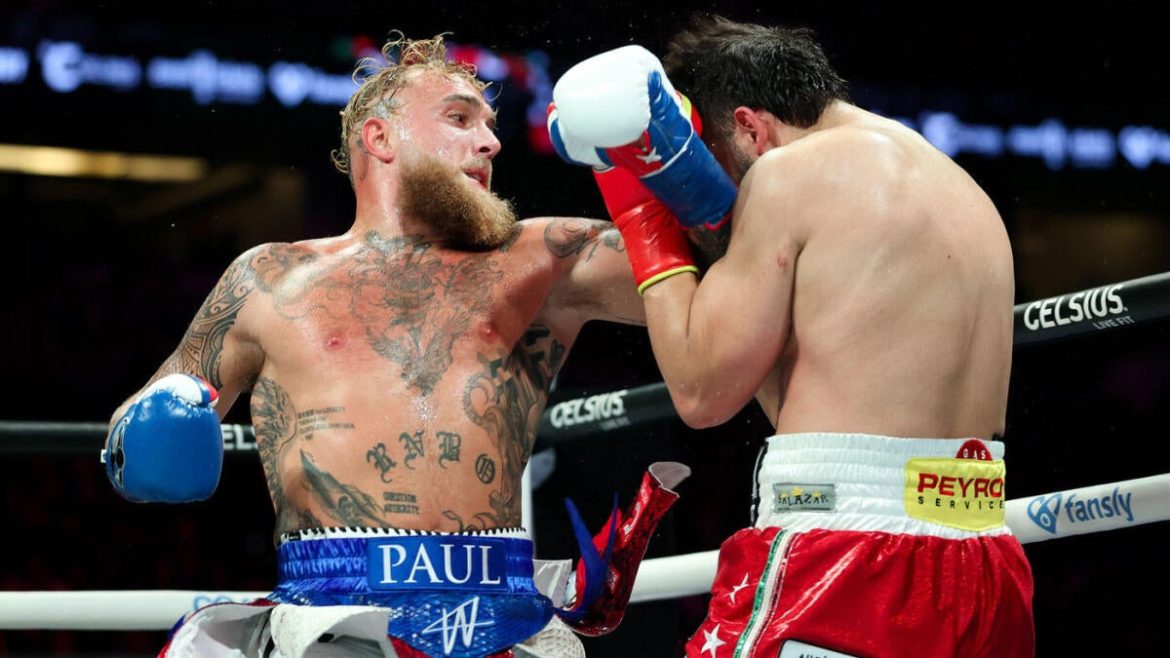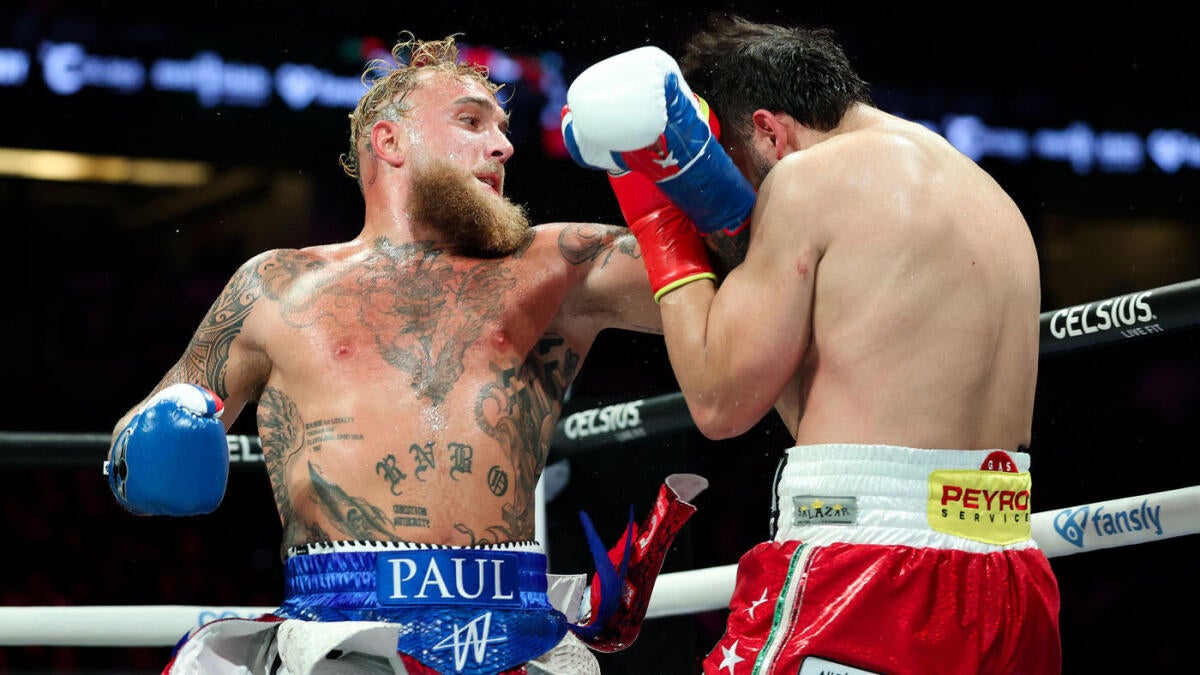Jake Paul’s recent victory over Julio Cesar Chavez Jr. at the Honda Center in Anaheim, California, was a landmark moment in his boxing career and a significant event in the cruiserweight division. The 10-round cruiserweight contest was not just another fight for Paul; it was a critical step in his journey toward mainstream boxing recognition. This bout showcased Paul’s ability to compete against a former world champion and solidified his position as a legitimate contender in the sport.
Background and Stakes
Jake Paul, who began his career as a social media personality, has steadily built his boxing record to 12-1. His opponent, Julio Cesar Chavez Jr., is a seasoned boxer with a storied legacy as the son of the legendary Julio Cesar Chavez Sr. and a former WBC middleweight champion. For Paul, defeating Chavez Jr. was not just about securing another win but about establishing credibility in the boxing world. A victory over a recognized name like Chavez Jr. would position Paul for future title contention and further legitimize his place in the sport.
The stakes were high, with the fight being broadcast on pay-per-view and drawing significant attention. This event blurred the lines between celebrity boxing and traditional combat sports, making it a pivotal moment for both Paul and the broader boxing landscape.
Fight Overview and Strategy
From the opening bell, Jake Paul took control of the fight. Reports and round-by-round analyses indicate that Paul was aggressive and effective, using his reach and movement to keep Chavez Jr. off balance. His strategy involved a strong jab, consistent body work, and sharp combinations that visibly affected Chavez Jr. Paul’s corner emphasized maintaining distance and striking cleanly, while Chavez Jr. initially struggled to find an effective counterstrategy. This early dominance allowed Paul to build a substantial lead on the judges’ scorecards, particularly in the first eight rounds.
Paul’s ability to dictate the pace and distance of the fight was a key factor in his success. His footwork and defensive skills were on full display, as he effectively neutralized Chavez Jr.’s attempts to close the distance. This tactical approach not only showcased Paul’s growth as a boxer but also highlighted his adaptability in the ring.
Julio Cesar Chavez Jr.’s Late Surge
Despite Paul’s early dominance, Chavez Jr. mounted a resurgence in the final two rounds. He showed flashes of the championship form that had earned him his titles in the past, increasing his aggressiveness and attempting to corner Paul. However, this late push was not enough to overcome the significant lead that Paul had built over the course of the fight. Chavez Jr.’s fatigue and the earlier punishment he sustained limited his effectiveness in the closing rounds, ultimately preventing him from mounting a genuine comeback.
This late surge, while impressive, was a testament to Chavez Jr.’s resilience and experience. However, it also underscored the importance of early dominance in a fight. Paul’s ability to maintain control throughout the majority of the rounds ensured that Chavez Jr.’s late efforts were not sufficient to change the outcome.
Judges’ Decision and Scorecards
The unanimous decision awarded to Jake Paul was wide but not a shutout, reflecting Chavez Jr.’s late-round improvement. The official scorecards read 99-91, 98-92, and 97-93, indicating strong judge agreement about Paul’s dominance in most rounds. This decision solidified Paul’s status as a legitimate contender, with a credible and definitive win over a former world champion. The wide margin of victory also highlighted the effectiveness of Paul’s strategy and execution throughout the fight.
Impact on Jake Paul’s Boxing Career
This victory is arguably the most significant of Paul’s career to date for several reasons. First, it established his legitimacy in the boxing world. Defeating a recognized boxer with substantial professional experience places Paul in a new category within the sport. His claim to future title opportunities becomes harder to dismiss, as he has now proven himself against elite competition.
Second, this win opens doors to higher-profile fights against elite boxers in the cruiserweight or even heavyweight divisions. Paul has publicly stated his ambition to become a world champion, and this victory brings him one step closer to that goal. The fight also attracted broad attention, from boxing purists curious about Paul’s legitimacy to casual fans drawn by his celebrity status. This event further blurs the lines between traditional boxing audiences and mainstream entertainment, expanding Paul’s fanbase and influence in the sport.
Broader Context and Boxing Landscape
Jake Paul’s ascent raises interesting questions about the evolving landscape of boxing. His ability to draw large pay-per-view numbers and hold his own against legitimate fighters is pushing promoters and governing bodies to reassess how fights are arranged and marketed. This shift challenges traditional notions of boxing and opens up new opportunities for crossover athletes and celebrities to make an impact in the sport.
Critics may still question the depth of Paul’s skills or the quality of his opposition compared to established pros, but his calculated rise shows a blend of savvy marketing and undeniable in-ring progress. Paul’s ability to combine entertainment value with legitimate boxing skills is a unique asset that sets him apart from other crossover athletes.
Conclusion: A Milestone With Future Promise
Jake Paul’s unanimous decision win over Julio Cesar Chavez Jr. marked a crucial turning point in his boxing career. By dominating a former world champion over 10 rounds, Paul moved beyond the realm of celebrity boxing into a position where his ambitions for world titles are no longer viewed as mere publicity stunts. This fight demonstrated Paul’s capacity to adapt, execute strategy, and withstand pressure—qualities essential for success at higher levels.
While Chavez Jr.’s late surge hinted at resilience, Paul’s consistent control and tactical execution were decisive. As Paul eyes bigger fights and possible world titles, this victory will be remembered as the moment he crossed a threshold in professional boxing, signaling that his place in the sport is more than just a novelty. The challenge now is sustaining this momentum against elite competition, cementing his place in boxing history not for his fame, but for his skill.





